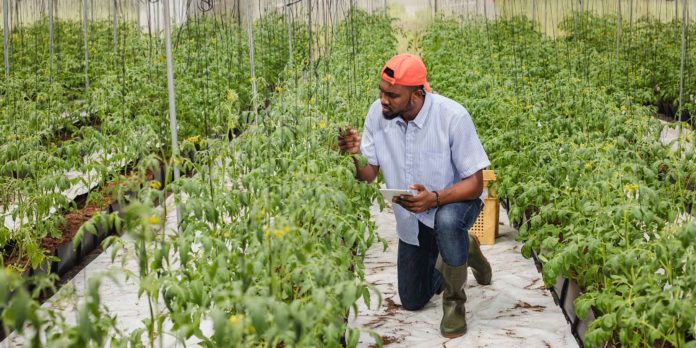The first West African agriculture Technology Park is set to open doors to public. Businesses, policymakers, farmers, researchers, and several other food system actors will get a chance to view proven and cutting-edge innovations organized by the iREACH agriculture technology park located in Bambey, 130 kilometers (70 miles) west of the Senegalese capital, Dakar. About 120 participants are expected at the October 6, 2021 event.
The iREACH technology park results from more than two years of work by a consortium of national, re gional, and international research and development actors in West Africa. The park has an overarching objective to improve the knowledge of actors on existing technologies and circumvent the usual low adoption of technologies and adoption.
“A technology park is a space where agriculture technologies and innovations are exhibited to improve the knowledge of actors on a value chain with the overarching aim of improving production systems,” explains Dr. Niéyidouba Lamien, a program manager at CORAF and current interim Director of Research and Innovation.
The Centre for the Improvement of the Adaptation to Drought (CERAAS) hosts the first agriculture tech Nology Park at its farm at the National Agricultural Research Center (CNRA) of Bambey.
A second park would be opened in Ghana in the months ahead – the host of the regional center of excellence on roots and tubers. Other regional collaborating institutions include regional centers of excellence in Burkina Faso, Mali, and Niger, bilateral Missions of the United States Agency for International Development, and the West Africa Regional Mission of USAID. USAID funds this initiative
Why Technology Parks?
Research institutions have developed many proven innovations. Yet, many are not known by the expec ted users, who are often farmers, producers, agro-dealers, and other businesses. In addition, researchers have many ways of scaling up technologies, including innovation platforms, agriculture fairs, digital platforms, etc. Drawing from other proven models experimented in other parts of the world such as Asia, key research actors in West Africa determined that the technologies parks might be a potential solution.
“There are many reasons for the low adoption of agriculture technologies and innovations. This can be because of the deficit or inadequate flow of knowledge between researchers and end-users or as a result of the lack of physical or financial access to the technology. With this technology park, we can increase the adoption of agricultural innovations and contribute to the transformation of the agriculture economy,” reasons Dr. Vara Prasad, Director and Dis tinguished Professor at SIIL. SIIL is one of the founding members of this initiative.
What is iREACH, and who are the implementing Partners?
iREACH is a novel research coordination tool designed to organize, in the pilot phase, the United States Agency for International Development (USAID)-funded research activities in Burkina Faso, Ghana, Mali, Niger and Senegal.
Promoters of this initiative include notably CORAF (host) and the Sustainable Intensification Innova tion Lab (SIIL) at Kansas State University (KSU). While the first four years may be focused on coordi nating USAID-funded activities, it is expected to expand progressively to include other development agencies in West Africa.
What is SIIL?
The Feed the Future Innovation Lab for Collaborative Research on Sustainable Intensification (SIIL) was established in 2014 at Kansas State University with the support from the USAID. The SIIL aims to become the global leader in transdisciplinary research, knowledge sharing, and capacity building, using sustainable intensification as a way to improve global food and nutritional security.
This vision is supported by the associated Digital and Geospatial Tools Consortium at Kansas State University, the Ap propriate Scale Mechanization Consortium at the University of Illinois at Urbana-Champaign, the Policy Research Consortium at Rutgers University, and the SOILS Consortium with the International Fertilizer Development Center (IFDC). The current focus countries are Bangladesh, Cambodia, and Senegal (past countries include Burkina Faso, Ethiopia, Malawi, and Tanzania). The iREACH program will initially focus on Senegal, Burkina Faso, Ghana, Mali, and Niger.
What is CORAF?
CORAF is a coordination tool among West and Central African countries, promoting sustainable food increases, family farmers’ competitiveness, and free inter and intra-regional trade. Established in 1987, CORAF comprises a vast network of institutions belonging to national agricultural research systems, from which it draws its mandate to act on their behalf.
With a membership from more than 23 countries in West and Central Africa, CORAF is Africa’s largest sub-regional research coordination organization. Regional Economic Communities such as the ECOWAS, UEMOA, ECCAS, and CEMAC have cooperative agreements, permitting CORAF to advance its agriculture priorities from a science and innovations perspective. CORAF has a track record of results that have earned the trust of the World Bank, Afri can Development Bank, European Union, Swiss Cooperation, AusAid, JICA, Global Affairs Canada, and other multilateral and bilateral institutions, which are its primary funders.









[…] Source link […]
Comments are closed.